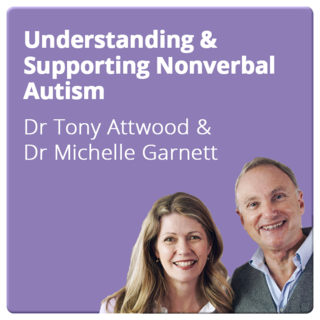LIVE WEBCAST
- Presented by Dr Tony Attwood and Dr Michelle Garnett
- Approximately 5½ hours of learning broken into manageable sessions with scheduled break times
- Access to the presentation for 60 days following the Live event
- A Live Chat Room for Q&A with Tony and Michelle throughout the day
- Downloadable PDF handouts supplied
- Certificate of completion
- $230.00 per person
This Live Webcast will equip participants to understand the reasons behind the challenging behaviour to working hypotheses that will meaningfully inform a positive behavioural support plan. Participants will learn effective strategies to assist to develop communication tools, teach new behaviours effectively, encourage good social outcomes, accommodate sensory sensitivity, and manage strong emotions.
Who will benefit:
All education professionals who see autistic children and/or adolescents who have limited or no speech including Teachers, Teacher Aides, SENCOs, Learning Support Co-ordinators, School Principals, Counsellors, RTLBs, and administrative staff. Other education and health service providers including Speech Language Therapists, Occupational Therapists, Physio Therapists, Psychologists, Paediatricians, Mental Health Workers, Support Workers, and Families.
Course description:
This presentation was formerly titled “Challenging Behaviour and Classic Autism” and the content has been updated to include new material and research findings. Topic covered include:
- Strategies to develop communication skills for those who have limited speech.
- The learning profile associated with nonverbal autism and strategies to encourage the acquisition of academic and daily living skills.
- The effects of social experiences and facilitating social engagement.
- The sensory profile of autism and how to accommodate sensory sensitivity.
- The signs of increasing anxiety, anger or despair and how to manage and moderate emotional reactions.
Teaching Process: The workshop includes a combination of didactic teaching, participant activities and Q&A. Participants attend via link to a live presentation. They have access to a chat room where they can ask questions at any time. There is opportunity to learn from workshop participants, as well as the trainers.
Course Content:
Module 1 – Participants will gain increased understanding of common speech and language disorders that can co-occur with autism and how these can contribute to the emergence and maintenance of challenging behaviour. A programme based on scientific outcomes, clinical wisdom and specific knowledge of autism is described for encouraging language in children with nonverbal autism. Participants will learn strategies for recognising the early signs of strong emotion and how to intervene at each level of emotional arousal for children with nonverbal autism.
Module 2 – Participants will develop an awareness of key aspects of the learning profile in autism. Equipped with an understanding of how autistic individuals learn, participants will be able to apply this knowledge to their teaching methods, as parents, carers, teachers and therapists.
Module 3 – Narrow circumscribed interests are often part of the autism profile and it can be difficult to know when to intervene. Participants will learn the reasons behind the special interests of autism, why these develop, the functions they serve, and when to act to modify the interest or decrease the time spent on the interest.
Module 4 – Social communication issues are one of the defining features of autism, and the source of marked distress and confusion, leading to challenging behaviour. Participants will leave the course with an understanding of the key issues underlying social communication problems in autism, how to encourage social skills in autism, and how to make interactions with autistic individuals successful.
Module 5 – Sensory overwhelm can be a key factor behind challenging behaviour. Participants will learn how to recognise and assess sensory processing differences, and how ti intervene to manage a broad variety of sensory issues, including visual, auditory, taste, smell, touch, vestibular, interoceptive, proprioceptive and vestibular sensory issues.
Module 6 – Participants will learn why autistic individuals tend to experience very strong emotions that can underpin challenging behaviour. They will leave the course understanding the neurology behind difficulties expressing emotion in autism, and will learn practical strategies to assist autistic individuals to manage anger, anxiety and stress without challenging behaviour.
Module 7 – Some of the issues autistic individuals face that can lead to challenging behaviour are movement disorders and underlying medical issues. The course covers various movements disorders medical conditions that commonly occur in autism. Participants will learn how these can be masked and the importance of recognising these when faced with challenging behaviour

